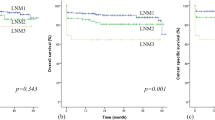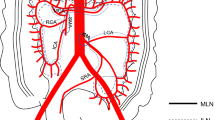Abstract
Background
The aim of the study was to determine factors predicting lymph node metastasis in patients with T1 or T2 colon cancer.
Methods
A total of 906 patients with T1 or T2 colon cancer who underwent colon resection with regional lymphadenectomy in a tertiary hospital, from January 2008 to December 2013, were analyzed. The prognostic factors for LN metastasis and the risk factors for survival were analyzed.
Results
There were 728 patients (80.4%) without lymph node metastasis (LN-negative group) and 178 patients (19.6%) with lymph node metastasis (LN-positive group). Tumor invasion depth (P < 0.001), lymphatic invasion (P < 0.001), and perineural invasion (P = 0.008) were significantly different between the two groups. During the median follow-up period of 69 months, the 5-year disease-free survival rate was 98.6% for the LN-negative group and 92.8% for the LN-positive group (P ≤ 0.001). In multivariate analysis, influencing factors associated with disease-free survival rate were LN metastasis (P = 0.001) and perineural invasion (P = 0.040). Female, depth of tumor invasion (P = 0.001), and lymphatic invasion (P < 0.001) were significant independent predictive factors for lymph node metastasis in multivariate analysis.
Conclusion
Positive LN status predicted poor disease-free survival in patients with early cancer. This suggests that depth of tumor invasion ≥ sm2 and the presence of lymphatic invasion in early colon cancer provide useful information to determine which patients would benefit from radical surgery.



Similar content being viewed by others
References
Huh JW, Kim HR, Kim YJ (2010) Lymphovascular or perineural invasion may predict lymph node metastasis in patients with T1 and T2 colorectal cancer. J Gastrointest Surg 14:1074–1080
(1983) General rules for clinical and pathological studies on cancer of the colon, rectum and anus. Part II. Histopathological classification. Japanese Research Society for Cancer of the Colon and Rectum. Jpn J Surg 13:574–598
Park YJ, Kim WH, Paeng SS, Park JG (2000) Histoclinical analysis of early colorectal cancer. World J Surg 24:1029–1035
Han J, Hur H, Min BS, Lee KY, Kim NK (2018) Predictive factors for lymph node metastasis in submucosal invasive colorectal carcinoma: a new proposal of depth of invasion for radical surgery. World J Surg 42:2635–2641
Kikuchi R, Takano M, Takagi K, Fujimoto N, Nozaki R, Fujiyoshi T, Uchida Y (1995) Management of early invasive colorectal cancer. Risk of recurrence and clinical guidelines. Dis Colon Rectum 38:1286–1295
Ishikawa Y, Akishima-Fukasawa Y, Ito K, Akasaka Y, Yokoo T, Ishii T, Toho Study Group for Cancer Biological B (2008) Histopathologic determinants of regional lymph node metastasis in early colorectal cancer. Cancer 112:924–933
Ueno H, Mochizuki H, Hashiguchi Y, Shimazaki H, Aida S, Hase K, Matsukuma S, Kanai T, Kurihara H, Ozawa K, Yoshimura K, Bekku S (2004) Risk factors for an adverse outcome in early invasive colorectal carcinoma. Gastroenterology 127:385–394
Volk EE, Goldblum JR, Petras RE, Carey WD, Fazio VW (1995) Management and outcome of patients with invasive carcinoma arising in colorectal polyps. Gastroenterology 109:1801–1807
Seitz U, Bohnacker S, Seewald S, Thonke F, Brand B, Braiutigam T, Soehendra N (2004) Is endoscopic polypectomy an adequate therapy for malignant colorectal adenomas? Presentation of 114 patients and review of the literature. Dis Colon Rectum 47:1789–1796 discussion 1796-1787
Kudo S, Kashida H, Tamura T, Kogure E, Imai Y, Yamano H, Hart AR (2000) Colonoscopic diagnosis and management of nonpolypoid early colorectal cancer. World J Surg 24:1081–1090
Mou S, Soetikno R, Shimoda T, Rouse R, Kaltenbach T (2013) Pathologic predictive factors for lymph node metastasis in submucosal invasive (T1) colorectal cancer: a systematic review and meta-analysis. Surg Endosc 27:2692–2703
Rasheed S, Bowley DM, Aziz O, Tekkis PP, Sadat AE, Guenther T, Boello ML, McDonald PJ, Talbot IC, Northover JM (2008) Can depth of tumour invasion predict lymph node positivity in patients undergoing resection for early rectal cancer? A comparative study between T1 and T2 cancers. Colorectal Dis 10:231–238
Bayar S, Saxena R, Emir B, Salem RR (2002) Venous invasion may predict lymph node metastasis in early rectal cancer. Eur J Surg Oncol 28:413–417
Nascimbeni R, Burgart LJ, Nivatvongs S, Larson DR (2002) Risk of lymph node metastasis in T1 carcinoma of the colon and rectum. Dis Colon Rectum 45:200–206
Goldstein NS, Hart J (1999) Histologic features associated with lymph node metastasis in stage T1 and superficial T2 rectal adenocarcinomas in abdominoperineal resection specimens. Identifying a subset of patients for whom treatment with adjuvant therapy or completion abdominoperineal resection should be considered after local excision. Am J Clin Pathol 111:51–58
Chok KS, Law WL (2007) Prognostic factors affecting survival and recurrence of patients with pT1 and pT2 colorectal cancer. World J Surg 31:1485–1490
Yim K, Won DD, Lee IK, Oh ST, Jung ES, Lee SH (2017) Novel predictors for lymph node metastasis in submucosal invasive colorectal carcinoma. World J Gastroenterol 23:5936–5944
Author information
Authors and Affiliations
Contributions
Study proposal, design, analysis, data collection, and writing of manuscript are attributed to You ** Lee and Jung Wook Huh. Responsibility to correspondence is attributed to Jung Wook Huh and Woo Yong Lee. All authors attributed to the enrollment of patients and approved the final version of the manuscript.
Corresponding authors
Ethics declarations
Conflict of interest
The authors declare that they have no conflict of interest.
Additional information
Publisher’s note
Springer Nature remains neutral with regard to jurisdictional claims in published maps and institutional affiliations.
Rights and permissions
About this article
Cite this article
Lee, Y.J., Huh, J.W., Shin, J.K. et al. Risk factors for lymph node metastasis in early colon cancer. Int J Colorectal Dis 35, 1607–1613 (2020). https://doi.org/10.1007/s00384-020-03618-7
Accepted:
Published:
Issue Date:
DOI: https://doi.org/10.1007/s00384-020-03618-7




